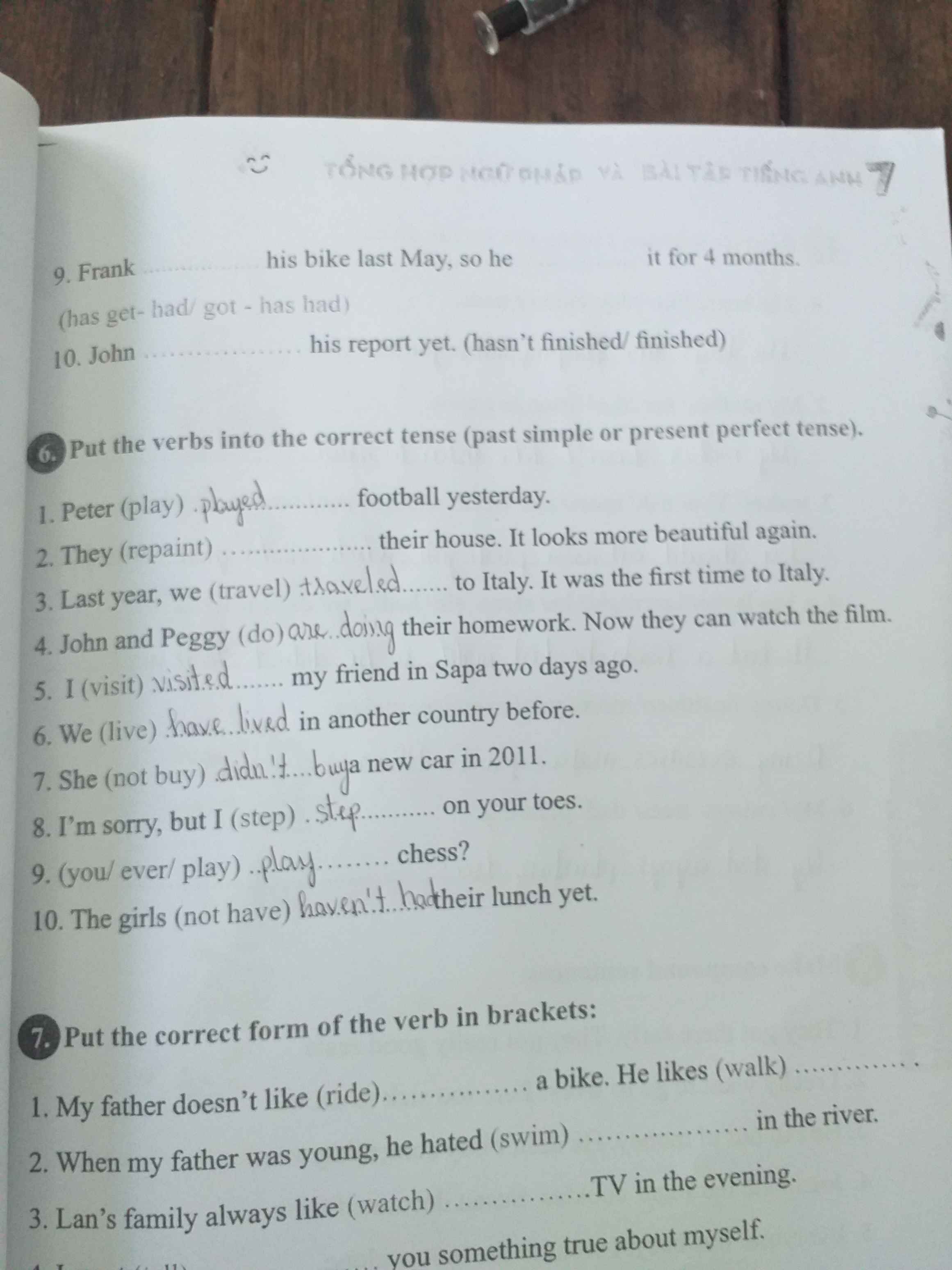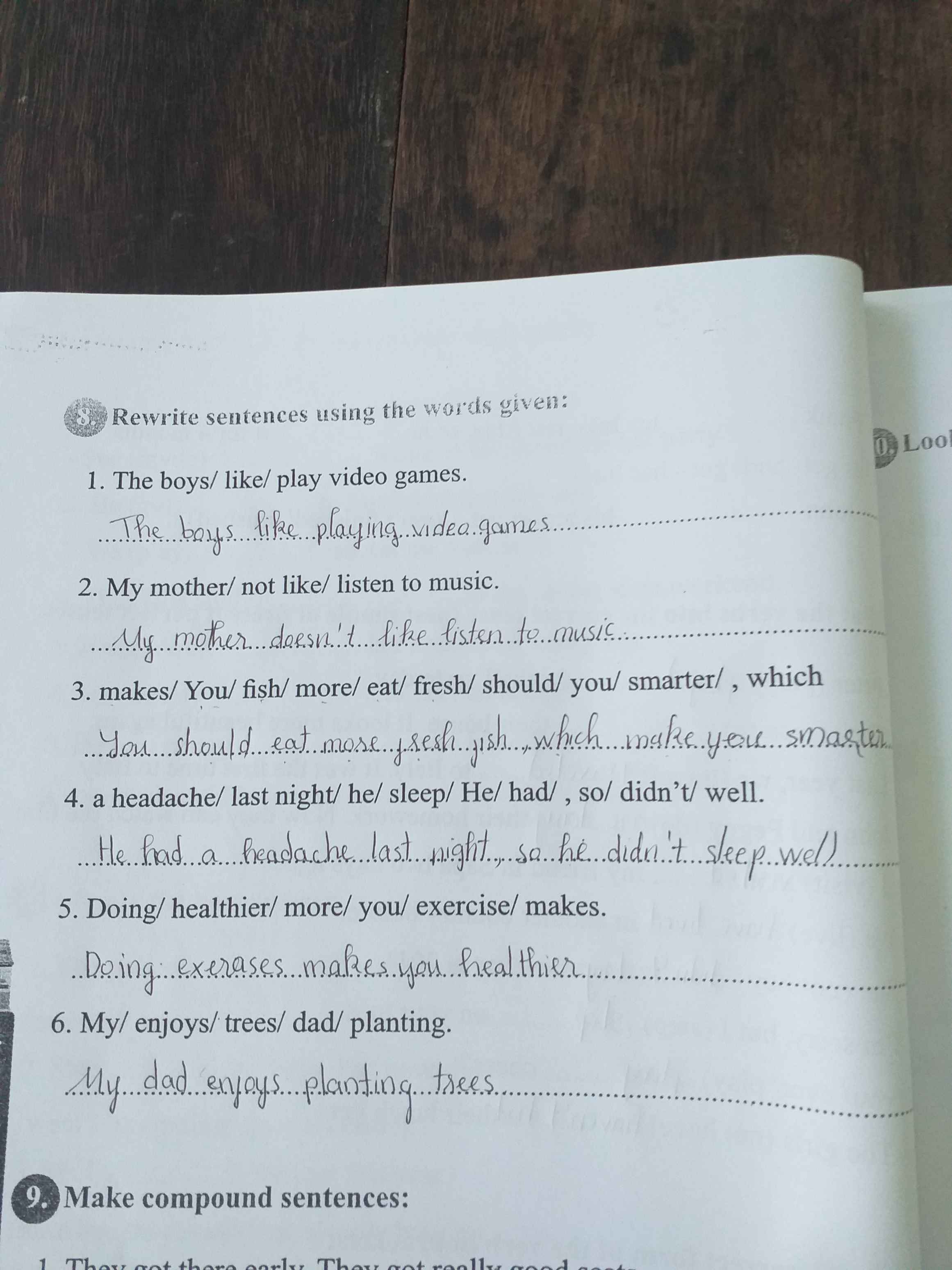
Hãy nhập câu hỏi của bạn vào đây, nếu là tài khoản VIP, bạn sẽ được ưu tiên trả lời.


Đề Lớp 7
I. Cho dạng đúng của động từ trong ngoặc. (2 điểm) 1.Mr Thanh ( be ) a doctor. He ( work) in a hospital in the city center. Every day he ( catch ) the bus to work.2.What ( your sister/ do ) now?- She ( cook ) dinner in the kitchen.3.We ( not go ) camping next week. We ( visit ) the museum.4.Miss Van is a journalist. She (not write) for Lao Dong Newspaper. She ( write ) for Nhan Dan Newspaper.5.I’d like (join) your club.II. Em hãy chọn một từ mà phần gạch chân có cách phát âm khác so với những từ còn lại. (1.5 điểm) 1. A. greatB. readerC. teacherD. means2. A. wetB. betterC. restD. pretty3. A. horribleB. hourC. houseD. here4. A. partyB. lovelyC. skyD. empty5. A. stoveB. momentC. sometimeD. closeIII. Em hãy đọc đoạn văn sau rồi chọn đáp án đúng cho mỗi câu hỏi. (1.5 điểm)Who are the best drivers? Which drivers are the safest on the roads? According to a recent survey, young and inexperienced drivers are the most likely to have an accident. Older drivers are more careful. Young men have the worst accident records of all. They often choose faster cars with bigger engines. One of the most interesting facts in the survey is that passengers have an effect on the drivers. When young male drivers have their friends in the car, their driving becomes worse. When their wife or girlfriend is in the car, however, their driving is better. But opposite is true for women. Their driving is more dangerous when their husband or boyfriend is in the car.1.Who have the worst accident records of all?A. Young menB. Young womenC. Old menD. Inexperienced men2.According to the survey, who are the most likely to have an accident ?A. Young and experienced drivers.B. Old and inexpericenced drivers.C. Young and old drivers.D. Young and inexpericenced drivers.3.Young men often choose _________.A. expensive cars.B. fast cars with big engines.C. slow cars with big engines.D. fast car with small engines.4.Who have an effect on the driver?A. passengersB. policemenC. childrenD. journalists.5.When young male drivers have the wife or girlfriend in the car, their driving becomes _________.A. worseB. betterC. slowerD. fasterIV. Cho dạng đúng của các tính từ trong ngoặc. (2.5 điểm) 1.Minh is student in our class. (good)2.July is than August. (hot)3.What’s day in your life? ( happy)4.These bags are than those ones. (expensive)5.That is armchair I have. (comfortable)6.Is Vietnam than Britain ? (large)7.Living in the city is than living in the countryside. (noisy)8.What is mountain in Viet Nam? (high)9.That movie is than this one. (boring)10.Who is teacher in your school? ( young)V. Em hãy điền một giới từ vào chỗ trống để hoàn thành những câu sau. (1 điểm) 1.Viet lives his aunt and uncle 83 Hoang Van Thu Street.2.Her birthday is October, 17th.3.Our party will be ten o’clock to half past eleventhe morning Sunday.4.What our place birth, Nam ?5.I’ll wait you outside the stadium.VI. Em hãy viết cách đọc những ngày tháng sau. (1.5 điểm)Ví dụ: 1/1: the first of January1.26/3 2.19/8 3.30/4 4.22/12 5.2/9

bài đầu thì tìm âm khác nhau với tìm từ khác loại
tiếp là mấy câu trắc nghiệm kiểu như khoanh vào ABCD

I. Find the words which has a different sound in the part underline.
1. A. wanted B. filled C. stayed D. played
2. A. vehicle B. mention C. enter D. helicopter
II. Find the words which has a different stress pattern.
3. A. traffic B. dancer C. cycling D. balloon
4. A. attention B.holiday C. pollution D. effective
III. Choose the correct option A, B, C or D to complete the sentences.
1. Solar energy _____by many countries in the world in the future.
A. use B. will use C. will be using D. will be used
2. _____is a renewable sourse.
A. Coal B. Oil C. Wind D. Gas
3. In the future most people will travel _____flying train.
A. in B. at C. on D. at
4. Do you think we _____driverless car in the future?
A. use B. to use C. will use D. have used
5. That picture is _____
A. us B. ours C. our D. we
6. Monowheel has a _____ wheel(s).
A. two B. three C. four D. one
7. Nuclear energy can provide electricity for the world needs, but it is _____
A. cheap B. unlimited C. dangerous D. safe
8. I like public _____ because it is cheap and convenient.
A. journey B. travel C. vehicle D. transport
9. Do you want to ____ a taxi or a train to Ha Noi capital?
A. fly B. walk C. drive D. take
10. At 6.00 am tomorrow, we _____ to Canada by plane.
A. will travel B. will be travelling C. will be travelled D. travel
B. READING COMPREHENTION (2,5 points)
* Read the passage about energy.
Energy is fundament to human beings. Many poor people in developing countries do not have modern sources of energy like electricity or natural gas, with which their life can be improved.
People who live in mountainous areas have to gather wood for fuel. This takes a lot of time. For many people living in rural areas, biogas is the largest energy resource available. The main use of biogas is for cooking and heating, but it can also provide energy for public transport. As biogas is smoke-free, it helps the problem of indoor air pollution. Moreover, it is made from plant waste and animal manure. They cost almost nothing.
The tendency to use renewable energy sources in developing sources in developing countries is on the increase as non-renewable ones are running out. In the future, the wind and the sun will be used as the most important environmentally friendly energy sources.
* Then answer the questions.
1. What don't many poor people in developing countries have?
....................................................................................................................................................
2. Where is biogas made from?
....................................................................................................................................................
3. Does biogas help the problem of indoor air pollution?
....................................................................................................................................................
4. What environmentally friendly enery sources will be used in the future?
....................................................................................................................................................
5. Is biogas renewable or non-renewable source?
....................................................................................................................................................
C. WRITING (2,5 points)
I. Rewrite these following sentences.
1. What is the distance between Ha Noi and Hai Phong?
-> How........................................................................................................................................
2. My father drank coffee in the morning but now he no longer does it.
-> He used...................................................................................................................................
3. My teacher is a good teacher of English.
-> My teacher............................................................................................................................
4. They will use much the wind - power in the future.
-> The wind -..............................................................................................................................
5. This is my bicycle.
-> This bicycle is........................................................................................................................
II. Rearrange the words to make meaningful sentences.
1. this time tomorrow/ English/ They/ will be learning/.
->................................................................................................................................................
2. Solar energy/ in the world/ by many countries/ will be used/.
->.................................................................................................................................................
3. it/ How long/ take/ to/ him/ does/ go to school/ foot/ on/?
->.................................................................................................................................................
4. People/ until/ flying cars/ use/ won't/ the year 2050.
->.................................................................................................................................................
5. from here/ 2 kilometers/ It's/ my house/ about/ to/?
->.................................................................................................................................................

ạn ôn về các thì đã học
hiện tại đơn : - cách chia vs tobe : I+ am
he/ she/it + is
you / we / they + are
- cách chia với động tù thường :
Do/Does + S + V + (O)?
Don't/doesn't + S + (O) ?
Do/does + S + not + V + (O)?
cách dùng
- Diễn tả thói quen hằng ngày
- Sự việc hay sự thật hiển nhiên
- Sự việc xảy ra trong tương lai theo lịch trình
suy nghĩ và cảm xúc tức thời
Dấu hiệu nhận biết
- “EVERY”: Every day, every year, every month, every afternoon, every morning, every evening...
- Once a day, twice a week, three times a week, four times a week, five times a week, once a month, once a year...
- Always, usually, every, often, generally, frequently, sometimes, ever, occasionally, seldom, rarely...
hiện tại tiếp diễn
tương lai đơn
Thì quá khứ đơn
thì hiện tại hoàn thành
các thì khác bn lên mạng tìm hiểu tương tự nhé

mình làm những bài bn chưa lm nhé
9B
10A
bài 2
have repainted
bàii 3
ride - walikking
swimming
watch

oxford toàn tiếng anh không ak.
Kiểu như: Điện thoại: Dùng để gọi, liên lạc
Thì trong đó ghi: Telephone: It's used to call
Nó viết thế có vài từ k biết thì tra ở đâu.

1. Conflict (n, v): mâu thuẫn, bất đồng
– I hope that won’t conflict with our plan in any way. (Hy vọng chuyện đó không mâu thuẫn với chương trình của chúng ta)
– She seems to be permanently in conflict with her superious. (Cô ta dường như lúc nào cũng bất đồng với cấp chỉ huy của mình)
2. Record (n, v): hồ sơ, ghi âm/ thu hình
– Remember to record the show. (Nhớ ghi âm/ thu hình buổi trình diễn nhé)
– I’ll keep a record of the request. (Tôi sẽ ghi vào hồ sơ lời yêu cầu này)
3. Permit (n, v): giấy phép, cho phép
– No one is permitted to pick the flowers. (Cấm không ai được hái hoa)
– We already got a permit to build a fence around the house. (Chúng tôi có giấy phép xây hàng rào quanh nhà)
4. Dis (n, v): không thích
– Tell me about your s and diss. (Hãy cho tôi biết bạn thích hay không thích những gì)
– Some men dis shopping.(Vài quý ông không thích mua sắm)
5. Increase (n, v): sự tăng, tăng
– There is sharp increase in gas prices.(Giá xăng tăng bất chợt)
– The company has increased its workforce by 10 percent.(Công ty đã tăng số nhân viên lên 10%)
6. Produce (n, v): nông phẩm, sản xuất
– If you want to buy fresh produce, go to farmers’ markets.(Nếu bạn muốn mua rau trái tươi thì hãy ra chợ của các nông dân)
– Nuclear power plants produce 20% of the country’s energy.(Nhà máy điện nguyên tử sản xuất 20% năng lượng toàn xứ)
7. Reject (n, v): sự loại, từ chối
– This product is a reject because it is damaged. (Sản phẩm bị loại vì hư)
– The committee rejected the proposal. (Ủy ban từ chối đề nghị)
8. Suspect (n, v): sự tình nghi, nghi ngờ
– He’s the police’s prime suspect in the case. (Anh ta là kẻ tình nghi chính của cảnh sát trong vụ án)
– I suspected that she was not telling the truth. (Tôi nghi cô ta nói dối)
Những từ có đuôi " ing " là các danh - động từ
Tức là vừa có thể là danh từ, vừa có thể là động từ
Cái này khái quát vậy thôi còn đâu lên mạng tra danh - động từ là ra ngay

- ban (v): cấm
- let (v): để cho, cho phép
- allow (v): cho phép

